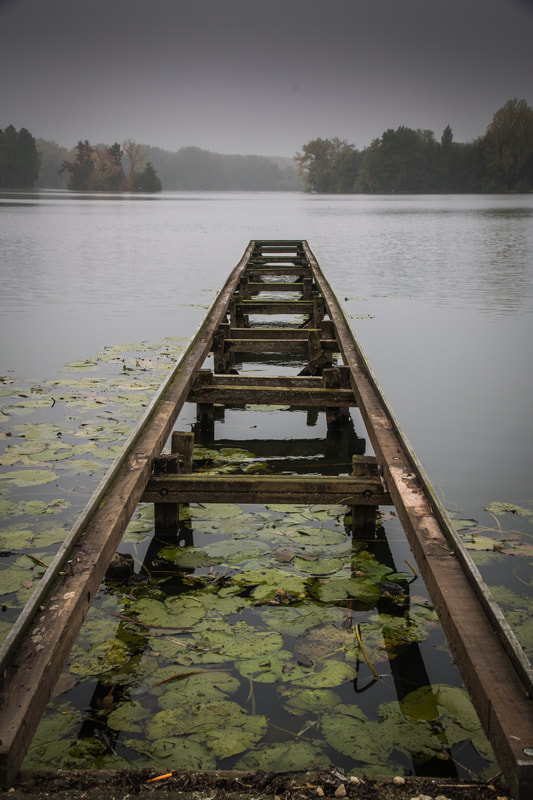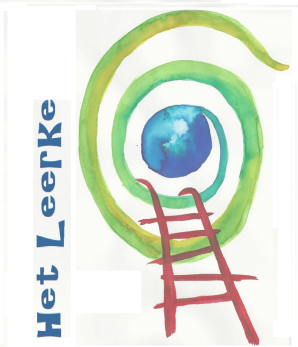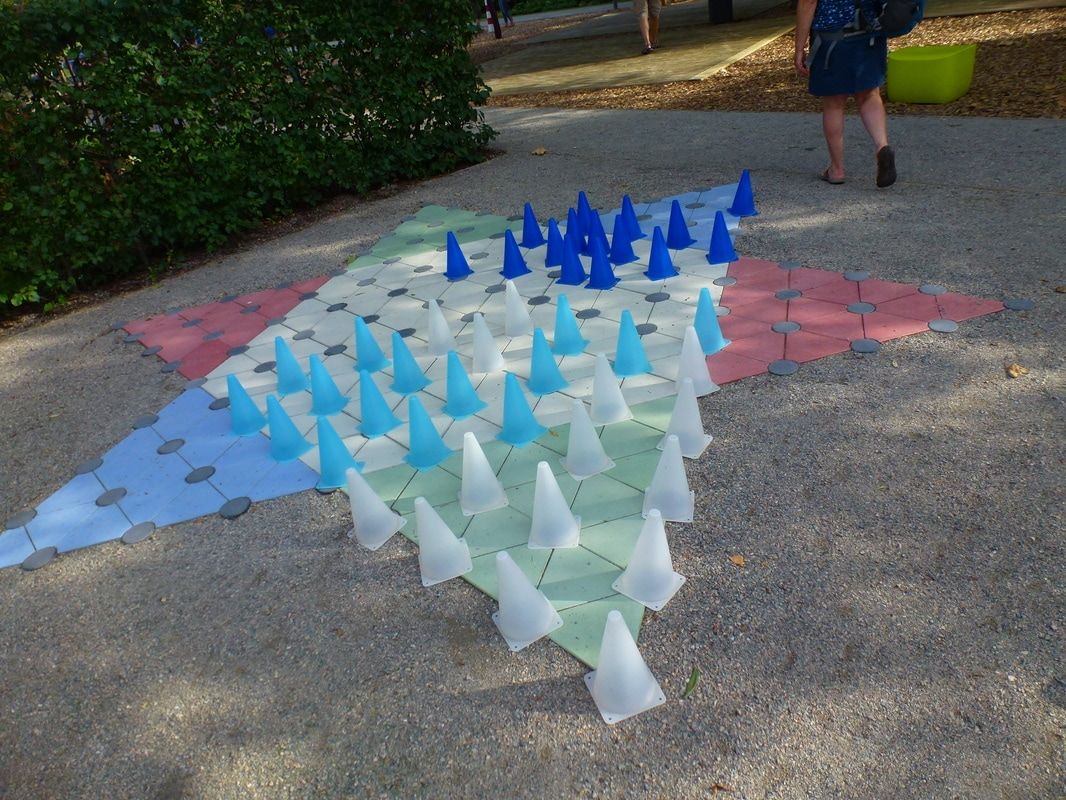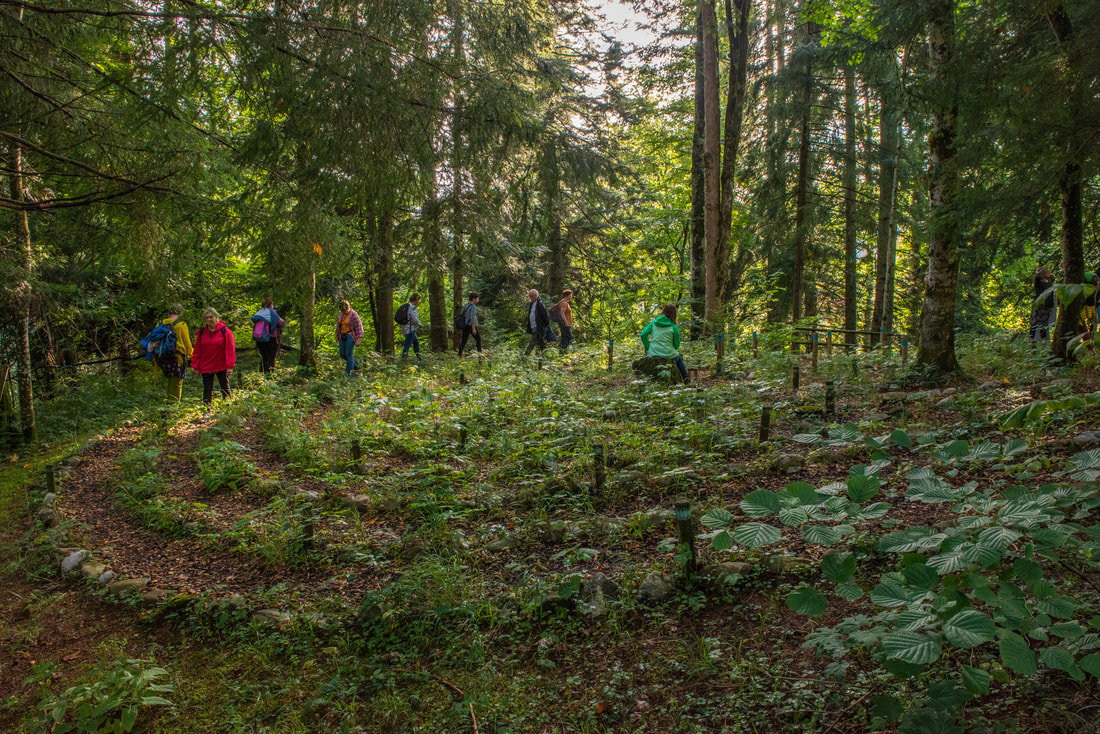New: European Bibliodrama Network Website : explore here
Echo from Kirchentag Stuttgart 2015: an article of Peter King

What does "Het Leerke" mean?
It is a Flemish word for "little ladder".
You can use a ladder to climb for reaching to something/ someone/ Someone above,
for looking over walls or people,
for crossing a fence or obstacle...
You can even make a bridge of it and connect one site with another.
And a a ladder can be used for going down, deeper...
and getting out of the deep...
The connection with or activities perhaps becomes clearer now.
By personal guidance, trough workshops with bibliodrama and creative methods
we try to give the participants tools
for looking further
reaching higher
digging deeper
crossing borders...
In Flemish "Leer" means also " Learning"...
We believe that people can keep going on learning trough every experience they have.
Het Leerke wants to reach a helping hand doing this.
And they assist in preparing and in leading rituals accompanying
moments of learning and discovering
of choices and engagements
of changes and new beginnings....
A never ending story that is part of the big variety of the great ladders/learnings of religions and philosophies of life"
It is a Flemish word for "little ladder".
You can use a ladder to climb for reaching to something/ someone/ Someone above,
for looking over walls or people,
for crossing a fence or obstacle...
You can even make a bridge of it and connect one site with another.
And a a ladder can be used for going down, deeper...
and getting out of the deep...
The connection with or activities perhaps becomes clearer now.
By personal guidance, trough workshops with bibliodrama and creative methods
we try to give the participants tools
for looking further
reaching higher
digging deeper
crossing borders...
In Flemish "Leer" means also " Learning"...
We believe that people can keep going on learning trough every experience they have.
Het Leerke wants to reach a helping hand doing this.
And they assist in preparing and in leading rituals accompanying
moments of learning and discovering
of choices and engagements
of changes and new beginnings....
A never ending story that is part of the big variety of the great ladders/learnings of religions and philosophies of life"
European Advanced Bibliodrama Training
18 participants from nine European countries took part in the first course week of the European Advanced Bibliodrama trainings at the beginning of November, 2017 in Hamburg.
Guided by Dr. Wolfgang Wesenberg, Berlin, they reflected their bibliodramatic development and planned other projects in culturally mixed teams. Dr. Krystyna Sztuka from Częstochowa gave opportunity to become familiar with her approach of a Bibliodrama with meditative painting in the tension of frame and picture. In spite of the autumnal weather the exemplary work began in the stimulating surroundings of the Haus am Schüberg and ended with an installation on the subject ‚a new heaven and a new earth‘ under cloudy sky.
Additional there were many possibilities for colleague talks in spite of all difficulties to communicate in English.
In March the next course week will follow in Hungary with the main focus Jewish-Christian Bibliodrama with psychodramatic elements.
The participation in the course is promoted by the Program ERASMUS + of the European Commission, the German Society for Bibliodrama and the North Church.
Guided by Dr. Wolfgang Wesenberg, Berlin, they reflected their bibliodramatic development and planned other projects in culturally mixed teams. Dr. Krystyna Sztuka from Częstochowa gave opportunity to become familiar with her approach of a Bibliodrama with meditative painting in the tension of frame and picture. In spite of the autumnal weather the exemplary work began in the stimulating surroundings of the Haus am Schüberg and ended with an installation on the subject ‚a new heaven and a new earth‘ under cloudy sky.
Additional there were many possibilities for colleague talks in spite of all difficulties to communicate in English.
In March the next course week will follow in Hungary with the main focus Jewish-Christian Bibliodrama with psychodramatic elements.
The participation in the course is promoted by the Program ERASMUS + of the European Commission, the German Society for Bibliodrama and the North Church.
A reflection on our European Advanced Education Experience. See this
Pictures and reflections European Bibliodrama Conference Pieces of Peace
Foto's en verhalen van Pieces of Peace
Crawling like a worm beneath a tree where Jona is sitting surrounded by ‘his depression’ and ‘the not understanding’, while the poor man in Nineve tries to make contact with Jona.
For people who were not there or never heard of bibliodrama before, this sentence may seem very strange. And in a way, it was. After all, what can a little worm who’s destiny is to eat, contribute to the way the story goes. But for me, who was (in the role of) that worm and for the other people that were on the 13th bibliodramaconference in Belgium it was a very strong experience. We saw how Jona changed from a depressed, angry and jealous man to someone who could feel empathy for the poor man in Nineve.
That is not what the story in the Bible tells, but that’s the richness of stories. They don’t tell everything. They leave space to interpret. What does a person thinks or feels on that moment? Jona, in the belly of the fish, for instance. We could choose a photo from 20 pictures and tried to sit or lay down as the figure presented on the picture. Sitting or lying, we were invited to feel and think like Jona in the fish and to make a drawing that expressed our thoughts.
Every workshop again Cocky and Anja, our workshopleaders, prepared us a wonderful program. I discovered new ways of working – from the warming up till the way of explaining how the bibliodramaplay was going to develop. I learned to express in a gesture what my impression was. I took all the ideas with me and use them already in my religion lessons with young Belgian adolescents.
Not only during the workshopmoments I gattered inspiration. Also in the morning prayers the creativity of Jes and Anne – the two Belgian organisers – really inspired me. They tried to integrate elements of other religions in the prayer – like the 99 beautiful names of Allah and the waterritual of the Maoripeople. I liked that. I strongly believe that we can learn from each other and that we can look to what brings us together instead off thinking of what divides us.
Just like the lesson to be learned from the visit to the Britisch/Canadian and the German cemetery in Flanders fields. All that young boys that lay there, forced to be each other’s enemy in World War I are always someone’s son, always someone’s father. We walked on the cemetery in silence, choosed a grave and made contact with the (un)known soldier that was buried there. A special experience.
This learning from each other came also during the pauses in the program, while waiting for our meal or sitting on the bus. Talking about ‘the transubstantiation’ is not what I do when I go out with my friends. Here on the conference where protestants and catholics and even some jewish people out of 13 different European countries met each other, it wasn’t a strange conversation. It made me even more open minded than I already was.
Leen Van der Schoot, Rijkevorsel (Belgium), Teacher of catholic religion, bibliodramaleader, [email protected]
Crawling like a worm beneath a tree where Jona is sitting surrounded by ‘his depression’ and ‘the not understanding’, while the poor man in Nineve tries to make contact with Jona.
For people who were not there or never heard of bibliodrama before, this sentence may seem very strange. And in a way, it was. After all, what can a little worm who’s destiny is to eat, contribute to the way the story goes. But for me, who was (in the role of) that worm and for the other people that were on the 13th bibliodramaconference in Belgium it was a very strong experience. We saw how Jona changed from a depressed, angry and jealous man to someone who could feel empathy for the poor man in Nineve.
That is not what the story in the Bible tells, but that’s the richness of stories. They don’t tell everything. They leave space to interpret. What does a person thinks or feels on that moment? Jona, in the belly of the fish, for instance. We could choose a photo from 20 pictures and tried to sit or lay down as the figure presented on the picture. Sitting or lying, we were invited to feel and think like Jona in the fish and to make a drawing that expressed our thoughts.
Every workshop again Cocky and Anja, our workshopleaders, prepared us a wonderful program. I discovered new ways of working – from the warming up till the way of explaining how the bibliodramaplay was going to develop. I learned to express in a gesture what my impression was. I took all the ideas with me and use them already in my religion lessons with young Belgian adolescents.
Not only during the workshopmoments I gattered inspiration. Also in the morning prayers the creativity of Jes and Anne – the two Belgian organisers – really inspired me. They tried to integrate elements of other religions in the prayer – like the 99 beautiful names of Allah and the waterritual of the Maoripeople. I liked that. I strongly believe that we can learn from each other and that we can look to what brings us together instead off thinking of what divides us.
Just like the lesson to be learned from the visit to the Britisch/Canadian and the German cemetery in Flanders fields. All that young boys that lay there, forced to be each other’s enemy in World War I are always someone’s son, always someone’s father. We walked on the cemetery in silence, choosed a grave and made contact with the (un)known soldier that was buried there. A special experience.
This learning from each other came also during the pauses in the program, while waiting for our meal or sitting on the bus. Talking about ‘the transubstantiation’ is not what I do when I go out with my friends. Here on the conference where protestants and catholics and even some jewish people out of 13 different European countries met each other, it wasn’t a strange conversation. It made me even more open minded than I already was.
Leen Van der Schoot, Rijkevorsel (Belgium), Teacher of catholic religion, bibliodramaleader, [email protected]
A beautiful cross border actionMeet the Belgians and the Dutch…
Since July 2016 Het Leerke is a new Belgian-Dutch organization which has bibliodrama as one of its main activities. They arose from the Flemish bibliodrama society “Tussen Hemel en Aarde” and developed to an independent ecumenical association after Tineke Dronkert from Holland joined them. With roots in the Flemish bibliodrama schools and in the different bibliodrama schools in Holland they have a very rich pattern of visions and working methods in their arsenal. They are very proud to be responsible for the 13th European Bibliodrama Conference. To prepare this gathering and to create a new network in the Dutch speaking zone they took the initiative for the first Belgian-Holland Bibliodrama meeting. Somewhere in the middle of November 2016 … twenty five people met each other on the fourth floor of a steel company, where the fire of inspiration burnt. Some came from Belgium, others from the Netherlands. For the first time in history we played together and experienced the enormous variety of the several approaches in bibliodrama. The pastoral – existential method (Andriessen – Derksen – Nolet), as well as the Flanders method which is practiced (among others) in primary and secondary schools and in communities of all kinds (parishes, prisons, religious communities, seminars…), and last but not least the more theatrical, dramatic method as developed by “de 7evende hemel” were explored. We played puppets with our hands. We demonstrated the essence of texts concerning the theme of ‘light’ by using clothes. We gathered around Mount Sinai in despair, waiting for Moses to return. We felt connected to each other during lunch time. It was a lovely day, an event to be remembered as the starting point of an ongoing tradition. |
More English articlesAn introduction on Belgian Bibliodrama history textraum__3__tekstversie.doc About working with non Biblical texts from_animal_talk_to_god_talk_3.doc Reflections on the theme of safety and basic bibliodrama About the European Advanced Training in Textraum A successful bibliodrama is... bouwen_safety_first_textraum.docx |



